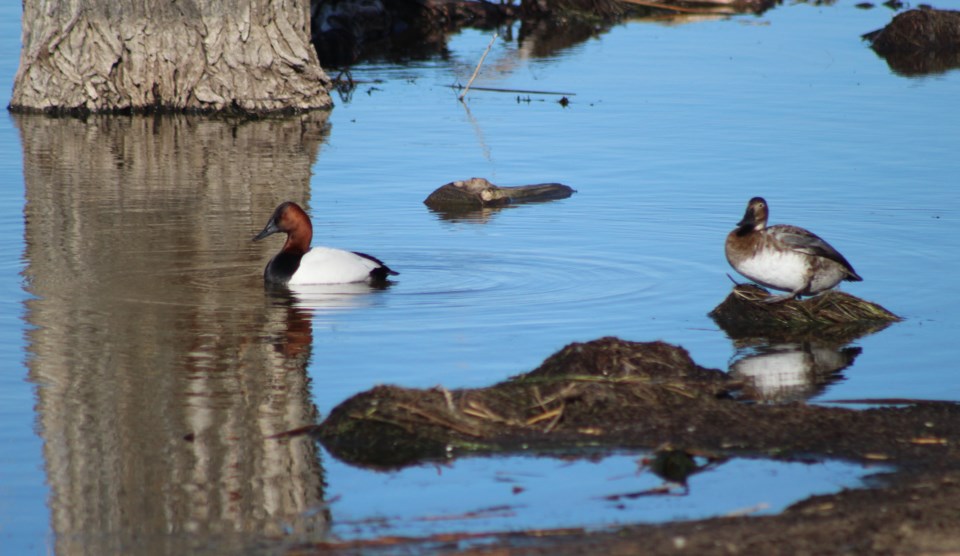BONNYVILLE - “A number of waterfowl have been found deceased or acting ill along Jessie Lake in recent days,” stated the Town and MD of Bonnyville in a joint statement released Tuesday morning.
According to the two municipalities, the appropriate officials within the Alberta government have been contacted about the deceased birds.
Specimens have also been collected by Alberta Fish and Wildlife and sent for testing, states the media release. Results are expected back in the coming weeks.
Reports of the symptoms observed are a strong indicator of Avian Influenza, according to the municipalities.
The waterfowl reported to be affected in the Bonnyville area are Eared Grebes, but others have reported a wide variety of species of birds found deceased in large quantities.
Eared Grebes are small waterbirds that are mostly black in colour with chestnut brown flanks and golden plumes fanning out from behind bright red eyes. Eared Grebes' body colour can also be grayish black overall.
Both municipalities are asking members of the public to report if they notice clusters or groups of dead waterfowl or raptors (hawks, owls, falcons), corvids (raven, magpie, crow) or gulls. Reports can be made to Alberta Environment and Parks toll-free at 310-0000.
The statement also notes that members of the public should avoid handling living or dead wild birds.
Residents flock to social media over bird concerns
On Sunday evening, two posts were shared on a Bonnyville social media platform stating that hundreds of birds were found dead or extremely ill along the shores of Jessie Lake.
One post noted that 40 birds were found dead near the Bonnyville Splash Park on Sunday evening.
Families who were at the splash park around the time the post was published told Lakeland Today that an RCMP member had arrived at the park to look around the area but left shortly after.
Lakeland Today was unable to receive a comment from the Bonnyville RCMP detachment on the matter as of initial publication of this story.
David Brennan, an MD resident, had also shared a social media post informing residents that he had come across hundreds of dead birds that ranged from ducks to smaller birds on Sunday afternoon along a portion of Jessie Lake Trail that runs parallel to Gurneyville Road.
“All along that walking path there are just little balls just lying everywhere there. Some of them are even ducks, some of them are those black and white seagulls... There was a variety of birds there,” said Brennan. “It’s wild. There were hundreds of them, easily.”
Early Tuesday morning, Brennan came across three other dead birds lying in the middle of Range Road 100, just north of the Beaver River Crossing.
“These ones were either crows or ravens – different from the birds I saw at Jessie Lake – and they were scattered across the road not that far from Goodridge,” he added.
Avian Flu arrives with migrating birds
It is a year of unprecedent numbers of the Avian Flu in Alberta, says Kellie Nichiporik, the environmental program manager with Lakeland Agriculture Research Assocation (LARA).
The 2022 migratory season has brought with it an outbreak of a highly pathogenic Avian Influenza strain – H5N1.
This strain has been found to affect both wild and domestic birds across Canada and USA.
“Avian Flu spreads very rampantly, it's highly contagious and it's been very well observed this spring with migratory birds, and quite a few dead birds that have been found in fields all across the province,” stated Nichiporik.
She noted that the spread of avian flu this season has been devastating for the poultry industry, as well as for all other egg layers.
While Avian influenza primarily affects waterfowl, it can easily spread to domestic poultry such as turkeys, ducks and chickens.
And although the cause of the mass death of birds in the Bonnyville area has not been confirmed through testing, both Brennan and Nichiporik say they would not be surprised it was the Avian Flu.
“It's not surprising that it's here, because there's really no area of the province that hasn't noted it,” said Nichipork.
“There have been commercial flocks down in Ponoka and even further north that have had Avian Flu and it's been noted in wild birds all across the province already. It's not new, but it's not been seen on this scale ever in Alberta,” she added.
The outbreak of H5N1 began in early April 2022 in the province, according to the Government of Alberta.
“In mid-May the outbreak appeared to decline, as evidenced by fewer sick or dead waterfowl or raptors. Currently (early June), the outbreak appears to have ended and we are no longer tracking or testing individual dead wild birds,” states the Alberta government’s website.
“As migrating waterfowl moved north through the province, there was local(ized) mortality of many snow geese and a few Canada geese, as well as various sick or dead raptors and waterfowl.”
Despite the recent update from the province declaring the outbreak to have declined, as of June 20, the Avian Influenza Risk Level for poultry has been updated to ‘Red.’
Tips for handling deceased birds
If handling of deceased birds cannot be avoided, it is recommended people wear disposable gloves, place a plastic bag over your hand before picking up the dead bird, or shuffle the dead bird into a box or container without touching it.
It is important to wash your hands with soap and water and disinfect any surfaces that have come into contact with the dead birds using alcohol, diluted bleach, or commercial disinfectants.
Symptoms of Avian Influenza
While head tremors and limp neck are common signs of Avian Influenza in sick wild birds, signs of Avian Flu in domestic birds can include:
• Drop in production of eggs/soft shells/eggs without shells
• High and sudden mortality rate
• Quietness and extreme depression
• Swelling of the skin under the eyes
• Swelling/congestion of wattles and combs



